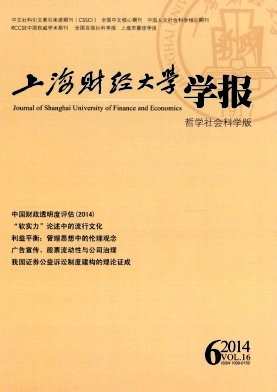企业文化对企业社会责任的影响:领导风格与高管团队行为整合的作用
上海财经大学学报 2014 年 第 16 卷第 06 期, 页码:30 - 39
摘要
参考文献
摘要
由于企业社会责任的履践出现企业文化缺位时的局限性,需要基于企业文化的视角研究企业社会责任的前因。文章通过587位企业家的问卷调查,证实企业文化的四个维度都对企业社会责任产生显著的正向影响,在企业文化到企业社会责任的影响机制中要通过高管团队行为整合这一中介变量发挥作用,因此应重视高管团队的合作行为以及彼此信息交换的充分性、及时性、准确性;同时,变革型领导会发挥一定程度的正向调节效应,而交易型领导则发挥一定程度的负向调节效应,因此,在企业文化到企业社会责任的影响过程中,应提倡变革型领导风格的发挥而抑制交易型领导风格的发挥。文章为中国企业家提供基于社会责任的价值观坐标和精神坐标,从而使其更好地履践社会责任和创造企业价值。
[1]曹家彦.企业家社会责任认知与企业社会责任行为关系的研究[D].浙江大学公共管理学院,2009.
[2]王晶晶,杨洁珊.企业社会责任的研究现状及未来研究展望——基于CSSCI来源期刊中经济学、管理学类期刊上文章的分析[J].管理评论,2010,(8):96-102.
[3]辛杰.利益相关者视角下的企业社会责任研究——以山东省1 400家企业问卷调查为例[J].山东大学学报(哲社版),2009,(1):120-125.
[4]姚振华,孙海法.高管团队行为整合的构念和测量:基于行为的视角[J].商业经济与管理,2009,(8):28-36.
[5]Agle B.R.Who Matters to CEOs?An Investigation of Stakeholder Attributes and Salience,Corporate Performance and CEO Values[J].Academy of Management Journal,1999,42(5):507-525.
[6]Bass B.M.Leadership and Performance beyond Expectations[M].New York:Free Press,1985.
[7]Bass B.M.,Avolio B.J.Leadership Theory and Research:Perspectives and Directions[M].San Diego:Academic Press,1993.
[8]Bass M.,Avolio B.J.Improving Organizational Effectiveness Through Transformational Leadership[M].Thousand Oaks,CA:Sage,1994.
[9]Bass M.,Avolio B.J.Multifactor Leadership Questionnaire[M].Palo Alto:Consulting Psychologists Press,1996.
[10]Branco C.,Rodrigues L.Corporate Social Responsibility and Resource Based Perspectives[J].Journal of Business Ethics,2006,69(2):111-132.
[11]Brickson S.L.Organizational Identity Orientation:The Genesis of the Role of the Firm and Distinct Forms of Social Value[J].Academy of Management Review,2007,32(3):864-888.
[12]Burns J.H.Leadership[M].New York:Harper&Row,1978.
[13]Cameron K.S.,Quinn R.E.Diagnosing and Changing Organizational Culture:Based on The Competing Values Framework[M].New York:Addison Wesley Press,1998.
[14]Carroll A.Three-dimensional Conceptual Model of Corporate Performance[J].Academy of Management Review,1979,4(4):497-505.
[15]Casimir G.Combinative Aspects of Leadership Style:The Ordering and Temporal Spacing of Leadership Behaviors[J].Leadership Quarterly,2001,12(3):245-278.
[16]Cook R.A.,Hartmann J.L.Interpreting the Cultural Styles Measured by the OCI[A].In Organizational Culture Inventory Leader’S Guide[M].Plymouth,MI:Human Synergistics,1989.
[17]Edmondson A.C.A dynamic Model of Top Management Team Effectiveness:Managing Unstructured Task Streams[J].The Leadership Quarterly,2006,(14):297-325.
[18]Grisaffe D.Understanding and Managing Linkages of Information within Your Organization[A].Presented at Walker Information Global Network Member Training[C].Indiznapolis,IN.2000,(22):203-251.
[19]Hambrick D.C.,Mason P.A.Upper Echelons:The Organization as a Reflection of Its Top Managers[J].The Academy of Management Review,1984,9(2):193-206.
[20]Hambrick D.C.,Chen M.J.The Influence of Top Management Team on Firms’Competitive Moves[J].Ad-ministrative Science Quarterly,1996,(41):659-684.
[21]Hater J.J.,Bass B.M.Superiors’Evaluations and Subordinates’Perceptions of Transformational and Transactional Leadership[J].Journal of Applied Psychology,1998,(73):695-702.
[22]Hemingway C.A.Personal Values for Corporate Social Entrepreneurship[J].Journal of Business Ethics,2005,60(3):233-249.
[23]Kilman R.,Saxton M.Issues in Understanding and Changing Culture[J].California Management Review,2006,28(2):87-94.
[24]Ling Y.,Simssek Z.Transformational Leadership’s Roles in Promoting Corporate Entrepreneurship:Examining the CEO-TMT Interface[J].Academy of Management Journal,2008,51(3):557-576.
[25]Mudrack P.Individual Personality Factors that Affect Normative Beliefs about the Rightness of Corporate Social Responsibility[J].Business&Society,2007,46(1):33-62.
[26]Simsek Z.,Veiga J.F.,Lubatkin M.H.,Dino R.N.Modeling the Multilevel Determinants of Top Management Team Behavioral Integration[J].Academy of Management Journal,2005,48(1):69-84.
[27]Sturdivant D.A.Unpacking the Relationship between CEO Leadership Behavior and Organizational Culture[J].Leadership Quarterly,1987,(17):113-137.
[28]Ullmann A.Date in Search of a Theory:A Critical examination of the Relationship among Social Performance,Social Disclosure and Economic Performance[J].Academy of Management Review,1985,10(5):78-89.
[29]Vera A.D.,Crossan M.Improvisation and Innovative Performance in Teams[J].Organization Science,2005,(3):203-224.
[30]Wood C.Corporations,Stakeholders&Sustainable Development:A Theoretical Exploration of Business-Society Relations[J].Journal of Business Ethics,1995,63(5):263-281.
[2]王晶晶,杨洁珊.企业社会责任的研究现状及未来研究展望——基于CSSCI来源期刊中经济学、管理学类期刊上文章的分析[J].管理评论,2010,(8):96-102.
[3]辛杰.利益相关者视角下的企业社会责任研究——以山东省1 400家企业问卷调查为例[J].山东大学学报(哲社版),2009,(1):120-125.
[4]姚振华,孙海法.高管团队行为整合的构念和测量:基于行为的视角[J].商业经济与管理,2009,(8):28-36.
[5]Agle B.R.Who Matters to CEOs?An Investigation of Stakeholder Attributes and Salience,Corporate Performance and CEO Values[J].Academy of Management Journal,1999,42(5):507-525.
[6]Bass B.M.Leadership and Performance beyond Expectations[M].New York:Free Press,1985.
[7]Bass B.M.,Avolio B.J.Leadership Theory and Research:Perspectives and Directions[M].San Diego:Academic Press,1993.
[8]Bass M.,Avolio B.J.Improving Organizational Effectiveness Through Transformational Leadership[M].Thousand Oaks,CA:Sage,1994.
[9]Bass M.,Avolio B.J.Multifactor Leadership Questionnaire[M].Palo Alto:Consulting Psychologists Press,1996.
[10]Branco C.,Rodrigues L.Corporate Social Responsibility and Resource Based Perspectives[J].Journal of Business Ethics,2006,69(2):111-132.
[11]Brickson S.L.Organizational Identity Orientation:The Genesis of the Role of the Firm and Distinct Forms of Social Value[J].Academy of Management Review,2007,32(3):864-888.
[12]Burns J.H.Leadership[M].New York:Harper&Row,1978.
[13]Cameron K.S.,Quinn R.E.Diagnosing and Changing Organizational Culture:Based on The Competing Values Framework[M].New York:Addison Wesley Press,1998.
[14]Carroll A.Three-dimensional Conceptual Model of Corporate Performance[J].Academy of Management Review,1979,4(4):497-505.
[15]Casimir G.Combinative Aspects of Leadership Style:The Ordering and Temporal Spacing of Leadership Behaviors[J].Leadership Quarterly,2001,12(3):245-278.
[16]Cook R.A.,Hartmann J.L.Interpreting the Cultural Styles Measured by the OCI[A].In Organizational Culture Inventory Leader’S Guide[M].Plymouth,MI:Human Synergistics,1989.
[17]Edmondson A.C.A dynamic Model of Top Management Team Effectiveness:Managing Unstructured Task Streams[J].The Leadership Quarterly,2006,(14):297-325.
[18]Grisaffe D.Understanding and Managing Linkages of Information within Your Organization[A].Presented at Walker Information Global Network Member Training[C].Indiznapolis,IN.2000,(22):203-251.
[19]Hambrick D.C.,Mason P.A.Upper Echelons:The Organization as a Reflection of Its Top Managers[J].The Academy of Management Review,1984,9(2):193-206.
[20]Hambrick D.C.,Chen M.J.The Influence of Top Management Team on Firms’Competitive Moves[J].Ad-ministrative Science Quarterly,1996,(41):659-684.
[21]Hater J.J.,Bass B.M.Superiors’Evaluations and Subordinates’Perceptions of Transformational and Transactional Leadership[J].Journal of Applied Psychology,1998,(73):695-702.
[22]Hemingway C.A.Personal Values for Corporate Social Entrepreneurship[J].Journal of Business Ethics,2005,60(3):233-249.
[23]Kilman R.,Saxton M.Issues in Understanding and Changing Culture[J].California Management Review,2006,28(2):87-94.
[24]Ling Y.,Simssek Z.Transformational Leadership’s Roles in Promoting Corporate Entrepreneurship:Examining the CEO-TMT Interface[J].Academy of Management Journal,2008,51(3):557-576.
[25]Mudrack P.Individual Personality Factors that Affect Normative Beliefs about the Rightness of Corporate Social Responsibility[J].Business&Society,2007,46(1):33-62.
[26]Simsek Z.,Veiga J.F.,Lubatkin M.H.,Dino R.N.Modeling the Multilevel Determinants of Top Management Team Behavioral Integration[J].Academy of Management Journal,2005,48(1):69-84.
[27]Sturdivant D.A.Unpacking the Relationship between CEO Leadership Behavior and Organizational Culture[J].Leadership Quarterly,1987,(17):113-137.
[28]Ullmann A.Date in Search of a Theory:A Critical examination of the Relationship among Social Performance,Social Disclosure and Economic Performance[J].Academy of Management Review,1985,10(5):78-89.
[29]Vera A.D.,Crossan M.Improvisation and Innovative Performance in Teams[J].Organization Science,2005,(3):203-224.
[30]Wood C.Corporations,Stakeholders&Sustainable Development:A Theoretical Exploration of Business-Society Relations[J].Journal of Business Ethics,1995,63(5):263-281.
引用本文
辛杰. 企业文化对企业社会责任的影响:领导风格与高管团队行为整合的作用[J]. 上海财经大学学报, 2014, 16(6): 30–39.
导出参考文献,格式为:
上一篇:利益平衡:管理思想中的伦理观念





 8094
8094  436
436

